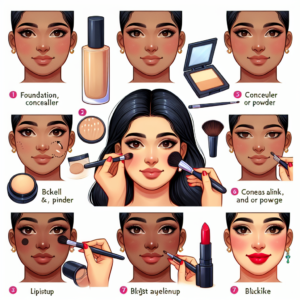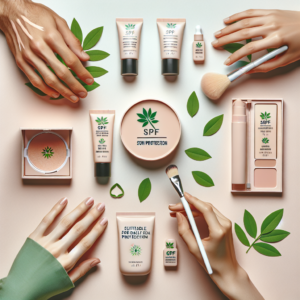
Key Takeaways: A Snapshot of Vegan SPF Makeup Essentials
- Understand the unique benefits of vegan makeup with SPF for sensitive skin.
- Learn how to identify and choose skin-loving ingredients in your makeup.
- Discover the importance of SPF in daily skin protection for all skin types.
- Find out how to select the perfect vegan SPF makeup for your specific skin needs.
- Gain tips on applying and reapplying vegan SPF makeup for maximum effectiveness.
What You Need to Know About Vegan SPF Makeup
When it comes to caring for sensitive skin, every ingredient counts. Makeup that’s vegan and contains SPF is more than a beauty trend; it’s a conscious choice for skin health and ethical living. But what exactly makes makeup vegan, and why should SPF be a non-negotiable part of your beauty routine? Let’s explore the essentials of vegan SPF makeup and how it can benefit every skin type.
Defining Vegan Makeup and Its Skin-Saving Benefits
Vegan makeup means products without any animal-derived ingredients. It’s a game-changer for sensitive skin, which often reacts to the hidden allergens and harsh chemicals found in conventional makeup. Vegan formulas are typically gentler, relying on natural and plant-based ingredients that nourish and protect your skin.
- Plant-based oils and extracts that hydrate and soothe.
- Natural minerals that provide color and coverage without irritation.
- Zero animal byproducts, which means less risk of allergic reactions.
- Eco-friendly packaging and production methods.
- A cruelty-free commitment that aligns with a compassionate lifestyle.
The Vital Role of SPF for Every Skin Type
Whether you have dry, oily, combination, or sensitive skin, SPF is your ally against the sun’s harmful rays. Daily exposure to UV radiation can lead to premature aging, hyperpigmentation, and even skin cancer. By choosing makeup with built-in SPF, you’re layering an extra shield that helps keep your skin resilient and youthful.
Remember, UV rays can penetrate clouds and glass, so even on overcast days or when you’re indoors near windows, your skin needs protection. Vegan SPF makeup acts as a multitasker, beautifying your skin while safeguarding your health.

Ingredients Matter
: What’s In Your Vegan SPF Makeup?
Not all vegan makeup is created equal, especially when it comes to sensitive skin. The key is to look for products with ingredients that support skin health and provide effective sun protection without causing irritation.
Common Vegan Ingredients to Look For
Here’s a list of skin-friendly ingredients that are often found in high-quality vegan SPF makeup:
- Zinc oxide and titanium dioxide for natural sun protection.
- Antioxidant-rich vitamins like Vitamin C and E to combat free radicals.
- Hydrating agents like hyaluronic acid and aloe vera.
- Mineral pigments for natural color without synthetic dyes.
- Botanical extracts to calm and soothe the skin.
- Non-comedogenic oils like argan or jojoba that won’t clog pores.
- Natural preservatives such as grapefruit seed extract to keep products fresh without harsh chemicals.
Ingredients to Avoid for Sensitive Skin
Steering clear of certain ingredients is just as important as the ones you embrace. Here are some common irritants and allergens that sensitive skin types should avoid:
- Parabens and phthalates, which can disrupt hormones and irritate the skin.
- Synthetic fragrances and colors, notorious for causing allergic reactions.
- Alcohol, which can dry out and strip the skin of its natural oils.
- Chemical sunscreens like oxybenzone, which can be harsh on sensitive skin.
- Silicones, which can trap debris and lead to breakouts.
Finding Your Perfect Match: Vegan SPF Makeup for Distinct Skin Types
Finding makeup that meets your ethical standards, protects your skin, and matches your skin type can feel like a tall order. But fear not, the perfect product is out there. It’s all about understanding your skin’s needs and knowing what to look for.
Best Picks for Dry Skin: Hydration Meets Protection
If your skin often feels tight or flaky, it’s thirsty for moisture. Vegan SPF makeup for dry skin should be rich in hydrating ingredients like hyaluronic acid, glycerin, and plant-based oils. These products not only quench your skin’s thirst but also provide a protective barrier against UV rays.
- Look for foundations and BB creams with a creamy texture.
- Choose products with nourishing oils like avocado or coconut oil.
- Avoid powders that can accentuate dry patches.
- Opt for makeup with a dewy finish to give your skin a healthy glow.
Shine-Free Solutions for Oily Skin
Oily skin can benefit from vegan SPF makeup that controls shine without clogging pores. Mineral-based products with zinc oxide or titanium dioxide can help absorb excess oil while offering sun protection. Mattifying primers and powders can also keep your skin looking fresh and grease-free.
- Seek out lightweight, oil-free formulas.
- Mineral powders can help set makeup and reduce shine.
- Blotting sheets are your best friend for touch-ups throughout the day.
- Remember to hydrate; oily skin needs moisture too!
Balanced Formulas for Combination Skin
Combination skin calls for a balancing act. Your vegan SPF makeup should hydrate dry areas without exacerbating oiliness in the T-zone. Look for versatile products that can adapt to your skin’s varying needs, providing moisture where it’s dry and oil control where it’s needed.
- Multi-tasking products are ideal for combination skin.
- Consider using different products for different areas of your face.
- Gel-based formulas can offer hydration without heaviness.
- Spot treat with mattifying products only where necessary.
Gentle Warriors: Vegan SPF for Sensitive Skin
Sensitive skin requires gentle warriors that fight off UV rays without causing redness or irritation. Fragrance-free, hypoallergenic, and non-comedogenic are terms to look for. Ingredients should be soothing, like chamomile or calendula, and the SPF should come from physical blockers that are less likely to cause a reaction.
- Physical sunscreens like zinc oxide are less irritating than chemical ones.
- Anti-inflammatory ingredients can help calm sensitive skin.
- Avoid makeup with too many acids or retinoids that can irritate.
- Test products on a small area before applying to your entire face.
How to Apply Vegan SPF Makeup for Maximum Benefit
Applying vegan SPF makeup correctly is crucial for ensuring you get the full benefit of its protective properties. Start with a clean, moisturized face. If you’re using a liquid foundation or tinted moisturizer, use your fingers, a brush, or a sponge to blend the product evenly across your skin.
Step-by-Step Guide for Flawless Coverage
Here’s how to achieve a flawless look while protecting your skin:
- Begin with a primer to create a smooth canvas.
- Apply your vegan SPF foundation starting from the center of your face and blend outwards.
- Use concealer to cover any blemishes or under-eye circles.
- Set your makeup with a light dusting of mineral powder if needed.
- Finish with a vegan SPF lip balm to protect your lips.
Remember, less is often more, especially for sensitive skin. Build coverage gradually to avoid caking.
Reapplication Without the Mess: Keeping Your Skin Protected
SPF needs to be reapplied every two hours when you’re in direct sunlight. For makeup wearers, this can be a challenge. Use a setting spray with SPF for a quick touch-up, or carry a compact of mineral powder with SPF for easy reapplication.
- Keep SPF-infused setting spray in your bag for on-the-go protection.
- Mineral powder compacts are convenient for midday touch-ups.
- Don’t forget to reapply to often-missed areas like your neck and ears.
The Sunscreen Debate: Physical vs. Chemical Vegan SPF
When it comes to sun protection in your makeup, there are two main types: physical and chemical. Physical sunscreens, also known as mineral sunscreens, use natural minerals to create a barrier on the skin’s surface that reflects UV rays. Chemical sunscreens, on the other hand, absorb UV rays before they can damage the skin.
For sensitive skin, physical sunscreens are typically recommended as they’re less likely to cause irritation. They contain active ingredients like zinc oxide or titanium dioxide, which are gentle on the skin and provide broad-spectrum protection.
- Physical sunscreens sit on top of the skin, making them less irritating.
- Chemical sunscreens can be more lightweight and less visible on the skin.
- Both types offer effective protection, but your skin’s sensitivity may dictate your choice.
- Always look for broad-spectrum protection to guard against both UVA and UVB rays.
Physical Sunscreens: Mineral-Based Barriers
Physical sunscreens are your skin’s personal bodyguards. They contain minerals like zinc oxide or titanium dioxide that sit on the surface to deflect harmful UV rays away from your skin. These ingredients are ideal for sensitive skin types because they’re less likely to cause irritation or allergic reactions. They’re also great for the environment, as they don’t contain chemicals that can harm marine life.
- Look for non-nano zinc oxide to avoid white residue.
- Choose tinted formulas for a more natural look.
- Check for “non-comedogenic” on the label to ensure it won’t clog pores.
- Mineral sunscreens are effective immediately upon application—no wait time needed.
- They offer broad-spectrum protection, shielding against both UVA and UVB rays.
Chemical Sunscreens: Absorbing Rays with Care
Chemical sunscreens work differently. They contain organic (carbon-based) compounds that absorb UV rays, convert them into heat, and release them from the skin. These sunscreens are often preferred for their lightweight, easy-to-apply nature. However, if you have sensitive skin, you’ll want to choose chemical sunscreens with care, opting for those with gentler ingredients and avoiding those with potential irritants like oxybenzone or octinoxate.
- Select chemical sunscreens with avobenzone or Mexoryl SX for gentle protection.
- Apply 15 minutes before sun exposure to allow the sunscreen to become effective.
- Reapply regularly, especially after sweating or swimming.
- Choose formulas with added moisturizers if you have dry skin.
Empowering Your Choice: Top Vegan SPF Makeup Brands
With the growing demand for vegan and cruelty-free products, many brands are stepping up their game. Here’s a rundown of some top players in the vegan SPF makeup space, known for their commitment to quality, ethics, and inclusivity.
Ethical and Effective: Brands That Champion Skin and Earth Health
When it comes to ethical and effective makeup, some brands stand out from the crowd. They not only provide protection and coverage but also take a stand for animal welfare and environmental sustainability.
- Coola: Offers a range of mineral and plant-derived SPF products.
- Supergoop!: Known for innovative and skin-friendly SPF formulations.
- Pacifica: Provides a wide array of makeup with SPF, all 100% vegan and cruelty-free.
- Ilia Beauty: Combines skincare and makeup, focusing on transparent ingredient lists.
- Derma E: Features mineral sunscreens and skincare with a focus on ethical practices.
SPF for All: Inclusive Shades and Textures
Everyone deserves to find SPF makeup that fits their skin tone and type. Brands are now offering a spectrum of shades and various textures to cater to all. From light to deep tones and from matte to dewy finishes, there’s something for everyone.
- Check for a wide range of shades to match your skin tone.
- Test different textures to see what feels best on your skin.
- Look for brands that use descriptive color names or provide swatches online.
- Remember, mineral sunscreens can be blended to fit skin tones better than ever before.
Navigating the Vegan SPF Makeup Landscape
Choosing the right vegan SPF makeup can be overwhelming. With so many options available, how do you know which one is right for you? Here are some tips to help you navigate the landscape and make informed choices.
How to Read Labels Like a Pro
Reading labels is key to understanding what you’re putting on your skin. Look for terms like “broad-spectrum,” “non-comedogenic,” and “hypoallergenic.” Check the active ingredients for zinc oxide or titanium dioxide if you’re going for a physical sunscreen, or for gentler chemical filters if you prefer chemical sunscreens.
- “Broad-spectrum” ensures protection against both UVA and UVB rays.
- “Non-comedogenic” means the product is less likely to clog pores.
- “Hypoallergenic” suggests the product is less likely to cause allergic reactions.
- Check the expiration date to ensure the product will be effective.
Dermatologist-Approved Selections
When in doubt, turn to the experts. Dermatologist-approved products have been vetted for safety and efficacy. These products are often suitable for all skin types, including sensitive skin, and are less likely to cause irritation. Look for seals of approval or recommendations from dermatological associations.
- Seek out products that have been tested for irritancy and allergies.
- Consider brands that are transparent about their testing methods.
- Products recommended by dermatologists are often fragrance-free and paraben-free.
- Don’t hesitate to ask your dermatologist for personalized recommendations.

Putting It All Together: Building Your Vegan SPF Makeup Routine
Creating a routine with vegan SPF makeup is like building a daily ritual that benefits your skin and aligns with your values. It’s about making choices that protect and enhance your skin’s natural beauty, while also being mindful of the ingredients and their impact on the environment and animal welfare.
Creating a Daily Vegan SPF Makeup Ritual
Start each morning with a clean slate. Use a gentle cleanser suitable for your skin type to remove any impurities. Follow up with a moisturizer to hydrate your skin. If your moisturizer doesn’t include SPF, apply a vegan sunscreen next. Once your sunscreen is absorbed, you can begin applying your vegan SPF makeup, starting with a primer, followed by foundation, and then the rest of your makeup routine.
- Cleanse your face to prepare your skin.
- Hydrate with a moisturizer or a hydrating vegan SPF product.
- Apply a primer to ensure an even application and extended wear.
- Choose a vegan SPF foundation that matches your skin type and tone.
- Complete your look with vegan eye makeup, blush, and lip products with SPF.
By sticking to this ritual, you’ll ensure that your skin is not only looking its best but is also well-protected throughout the day.
Transitioning Smoothly to Vegan SPF Makeup
Switching to vegan SPF makeup doesn’t have to be abrupt. Start by replacing products that you use daily, like your foundation or BB cream, with vegan alternatives that offer SPF protection. As you run out of your current products, look for vegan versions that meet your needs. This gradual shift allows your skin to adjust and you to find the products that work best for you.
- Begin by swapping out products you use every day.
- Research and sample different vegan SPF products to find your favorites.
- Read reviews and ask for recommendations from friends or online communities.
- Don’t be afraid to ask for samples at beauty counters or stores.
Remember, transitioning to vegan SPF makeup is a personal journey, and it’s okay to take it one step at a time.

Your Makeup, Your Values: The Impact of Your Vegan SPF Choices
Every swipe of lipstick, every dusting of powder, and every dab of foundation is a statement of your values. Vegan SPF makeup isn’t just about looking good; it’s about making choices that have a positive impact on the world around you.
The Cruelty-Free Revolution in Beauty
The beauty industry has seen a significant shift towards cruelty-free and vegan products. This movement is driven by consumers who demand transparency and ethics in their beauty products. By choosing vegan SPF makeup, you’re supporting brands that refuse to test on animals and that often advocate for animal rights and welfare.
- Supporting cruelty-free brands helps reduce animal testing.
- Choosing vegan products encourages more brands to consider ethical practices.
- By making conscious choices, you become part of a larger movement for change.
Small Swaps, Big Difference: The Environmental Perks
Vegan SPF makeup often comes with the added benefit of being more environmentally friendly. Many vegan brands prioritize sustainable sourcing, eco-friendly packaging, and natural ingredients that are less harmful to the planet. These small swaps in your makeup routine can lead to a big difference in your environmental footprint.
- Plant-based ingredients are often more sustainable than animal-derived ones.
- Biodegradable packaging reduces waste and pollution.
- Supporting brands with ethical sourcing helps protect wildlife and habitats.
Frequently Asked Questions (FAQ)
Can I use vegan SPF makeup as my sole form of sun protection?
While vegan SPF makeup provides an additional layer of protection, it should not be your only defense against the sun. For best results, start with a dedicated broad-spectrum sunscreen before applying your makeup. This ensures that you have a solid base of protection, as makeup may not be applied evenly or thickly enough to offer complete coverage. Reapply sunscreen every two hours when exposed to direct sunlight, and consider wearing protective clothing and seeking shade for optimal protection.
- Use a broad-spectrum sunscreen as a base.
- Reapply sunscreen every two hours, or more often if swimming or sweating.
- Supplement with vegan SPF makeup for added protection.
- Remember to cover all exposed skin with sunscreen, not just your face.
How can I ensure the vegan makeup I buy is truly cruelty-free?
To ensure your vegan makeup is truly cruelty-free, start by looking for certifications from reputable organizations like Leaping Bunny or PETA. These certifications mean the products and their ingredients have not been tested on animals at any stage of product development. Additionally, research the brand’s animal testing policies and commitment to ethical practices. Many cruelty-free brands are vocal about their stance and often provide detailed information on their websites.
- Look for official cruelty-free certifications on packaging.
- Research the brand’s animal testing policies and ethical commitments.
- Check for a company’s presence on verified cruelty-free lists online.
- Be cautious of brands that sell products in countries where animal testing is required by law.
- Engage with brands on social media or via email to ask about their practices.
What’s the best way to test vegan SPF makeup for sensitive skin?
The best way to test vegan SPF makeup for sensitive skin is to perform a patch test. Apply a small amount of the product to a discreet area of your skin, like the inside of your wrist or behind your ear. Wait 24 to 48 hours to see if there’s any adverse reaction, such as redness, itching, or bumps. If your skin remains clear, the product is likely safe for you to use. Always choose products labeled as hypoallergenic or non-comedogenic to minimize the risk of irritation.
- Conduct a patch test before using a new product.
- Choose hypoallergenic and non-comedogenic products.
- Wait 24 to 48 hours after a patch test to check for reactions.
- Start with a small product size or sample to test its compatibility with your skin.
Are there vegan SPF makeup options for darker or varied skin tones?
Yes, the beauty industry has made significant strides in offering vegan SPF makeup options for darker and varied skin tones. Many brands now recognize the importance of inclusivity and have expanded their shade ranges to cater to a diverse customer base. Look for brands that showcase a wide spectrum of shades and use models of different ethnicities in their advertising. This not only ensures that you can find a match for your skin tone but also supports brands that celebrate diversity.
- Search for brands with an extensive range of shades.
- Support companies that promote diversity in their marketing.
- Use online swatches and virtual try-on apps to find your match.
- Read reviews and watch tutorials from beauty influencers with similar skin tones.
Can vegan makeup with SPF improve my skin health over time?
Absolutely, vegan makeup with SPF can improve your skin health over time. By using products free from harsh chemicals and animal-derived ingredients, you’re less likely to experience irritation and allergic reactions. The addition of SPF protects your skin from UV damage, which can lead to premature aging and increase the risk of skin cancer. Over time, using these gentle and protective products can lead to healthier, more resilient skin.
- Vegan ingredients are often gentler on the skin, reducing the risk of irritation.
- SPF protects against harmful UV rays, preventing sun damage.
- Antioxidants in vegan makeup can help combat environmental stressors.
- Regular use of gentle, nourishing products can improve overall skin texture and appearance.
In conclusion, embracing vegan SPF makeup is more than a beauty choice; it’s a commitment to your skin’s health and well-being, as well as to ethical and sustainable practices. By choosing products that align with these values, you contribute to a kinder, more inclusive world, all while taking the best possible care of your skin. Remember to read labels, perform patch tests, and support brands that truly embody cruelty-free and inclusive values. With the right knowledge and tools, you can enjoy radiant, protected skin every day.




